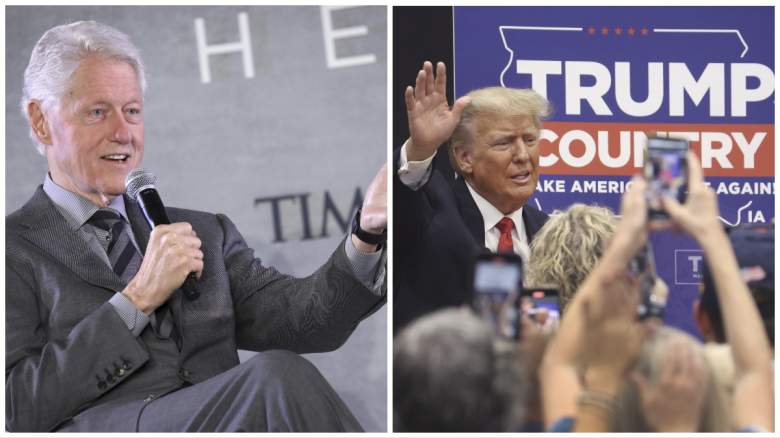
Getty Bill Clinton (l) and Donald Trump.
Former President Donald Trump and some of his supporters are raising the Bill Clinton “sock drawer” decision and Presidential Records Act in defense of the former president. However, other legal experts don’t believe the Clinton case will exonerate Trump.
Judicial Watch, the conservative organization that brought the case in 2012, ran an article by One America News Network titled, “Judicial Watch: Clinton Sock Drawer Audio Tape Case Exonerates Pres. Trump.” Other legal experts don’t agree with that blanket statement, however, even some conservative ones.
“[Special counsel] Jack Smith is terrified of the only standing legal case decision from a court concerning the Presidential Records Act,” said Chris Farrell, Director of Investigations at Judicial Watch, in that article.
The Clinton sock drawer case was also mentioned in previous court filings by Trump. The U.S. government has unsealed the full Trump indictment.
But what happened in the Clinton “sock drawer” decision, which is legally called, Judicial Watch v. National Archives and Records Administration?
Here’s what you need to know:
1. The ‘Clinton Sock Drawer’ Decision Involved Audiotapes Created by Former President Bill Clinton & a Historian
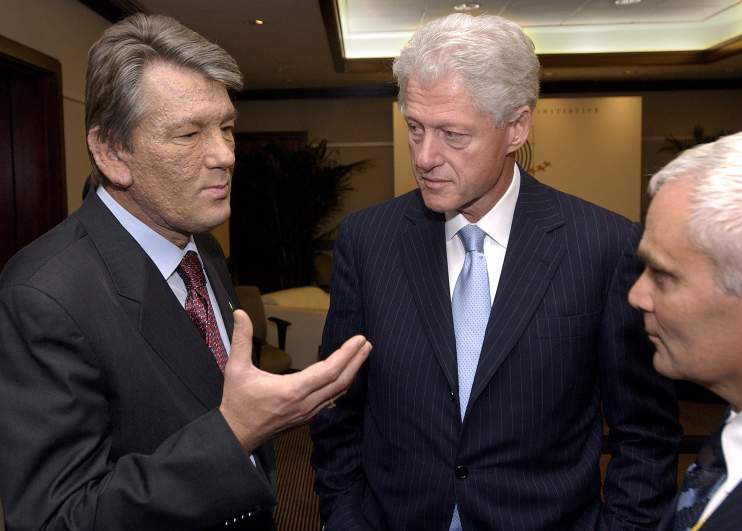
GettyUkrainian President Victor Yushchenko (L), speaks with Former U.S. President Bill Clinton (C) and Canadian businessman Frank Giustra at the Clinton Global Initiative forum September 16, 2005 in New York City.
The court decision dates to 2012, and it was authored by District Judge Amy Berman Jackson, who was nominated to the bench by former President Barack Obama.
According to the decision, the plaintiffs asked the court “to declare audiotapes created by former President William Jefferson Clinton and historian Taylor Branch during the Clinton administration to be ‘Presidential records’ under the Presidential Records Act (‘PRA’) and to order defendant ‘to assume custody and control’ of them and deposit them in the Clinton Presidential Library.”
Berman Jackson ruled:
The Court will grant the motion to dismiss pursuant to Rule 12(b)(1) because plaintiff’s claim is not redressable. NARA does not have the authority to designate materials as ‘Presidential records,’ NARA does not have the tapes in question, and NARA lacks any right, duty, or means to seize control of them. In other words, there has been no showing that a remedy would be available to redress plaintiff’s alleged injury even if the Court agreed with plaintiff’s characterization of the materials. Since plaintiff is completely unable to identify anything the Court could order the agency to do that the agency has any power, much less, a mandatory duty, to do, the case must be dismissed.
According to the plaintiffs, President Bill Clinton “enlisted historian Taylor Branch to assist him in creating ‘an oral history of his eight years in office,'” the court decision said. “In 2009, Branch published a book entitled, ‘The Clinton Tapes: Wrestling History with the President,’ based upon extensive conversations with President Clinton during his tenure in the White House and the events Branch observed when he was in the President’s office.”
The decision noted, “Plaintiff avers that from January 20, 1993 to January 20, 2001, Branch recorded seventy-nine audiotapes that ‘preserved not only President Clinton’s thoughts and commentary on contemporaneous events and issues he was facing as president, but, in some instances, recorded actual events such as presidential telephone conversations.'”
“Based on Branch’s book, plaintiff contends that the recordings captured a verbatim record of President Clinton being President—performing his duties by engaging in conversations while Branch happened to be there with the tape recorder running—as opposed to simply reflecting about the ongoing Presidency with the writer,” the decision says.
Among the discussions captured on the tapes, according to the decision, citing the plaintiffs, were “foreign-policy decisions such as the United States’ military involvement in Haiti and the contemplated relaxation of the United States’ embargo in Cuba.”
The judge found, “I am of the opinion that the audio tapes created by Taylor Branch are personal records of President Clinton as defined by the PRA.”
The Presidential Records Act of 1978, 44 U.S.C. ß2201-2209, “governs the official records of Presidents and Vice Presidents that were created or received after January 20, 1981 (i.e., beginning with the Reagan Administration). The PRA changed the legal ownership of the official records of the President from private to public, and established a new statutory structure under which Presidents, and subsequently NARA, must manage the records of their Administrations. The PRA was amended in 2014, which established several new provisions,” according to the National Archives.
The National Archives writes that PRA “establishes that Presidential records automatically transfer into the legal custody of the Archivist as soon as the President leaves office.”
2. Berman Jackson Ruled in the Clinton Sock Drawer Decision That the Responsibility to Classify Records ‘Is Left Solely to the President’
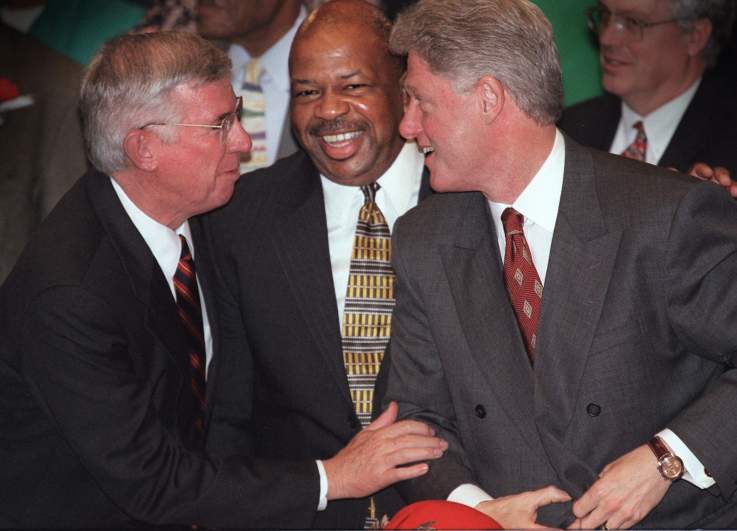
GettyBALTIMORE, : US President Bill Clinton (R) attends church with Maryland Governor Parris Glendening (L) and Rep. Elijah Cummings (C), (D-MD), 01 November at the New Psalmist Baptist Church in Baltimore, MD.
According to Berman Jackson’s ruling, “even if the Court were inclined to agree with plaintiff’s reassessment of President Clinton’s decision, it would not alter the conclusion that the injury cannot be redressed: the PRA does not confer any mandatory or even discretionary authority on the Archivist to classify records. Under the statute, this responsibility is left solely to the President.”
The court decisions says that the PRA, enacted during controversy over President Richard M. Nixon’s presidential records, “distinguishes Presidential records from ‘personal records,’ defining personal records as ‘all documentary materials, or any reasonably segregable portion thereof, of a purely private or nonpublic character which do not relate to or have an effect upon the carrying out of the constitutional, statutory, or other official or ceremonial duties of the President.'”
The statute provides that the ‘United States shall reserve and retain complete ownership, possession, and control of Presidential records,’ id. § 2202, and it directs the President to “take all such steps as may be necessary to assure that the activities, deliberations, decisions, and policies that reflect the performance of his constitutional, statutory or other official or ceremonial duties are adequately documented and that such records are maintained as Presidential records,” the decision says.
The court decision notes. “The statute assigns the Archivist no role with respect to personal records once the Presidency concludes.” The decision quotes another court decision as saying that the PRA “incorporates an assumption made by Congress (in 1978) that subsequent Presidents and Vice Presidents would comply with the Act in good faith, and therefore Congress limited the scope of judicial review and provided little oversight authority for the President and Vice President’s document preservation decisions.”
According to the decision, another case, Armstrong v. Bush, used broad language in stating “that the PRA accords the President ‘virtually complete control’ over his records during his time in office. 924 F.2d at 290. In particular, the court stated that the President enjoys unconstrained authority to make decisions regarding the disposal of documents: ‘[a]lthough the President must notify the Archivist before disposing of records … neither the Archivist nor Congress has the authority to veto the President’s disposal decision.'”
Berman Jackson wrote, “Since the President is completely entrusted with the management and even the disposal of Presidential records during his time in office, it would be difficult for this Court to conclude that Congress intended that he would have less authority to do what he pleases with what he considers to be his personal record.”
3. Bill Clinton ‘Squirreled Away the Cassettes in His Sock Drawer,’ Reports Say, But Some Argue That There Are Important Distinctions Between the Clinton Tapes & Trump Records
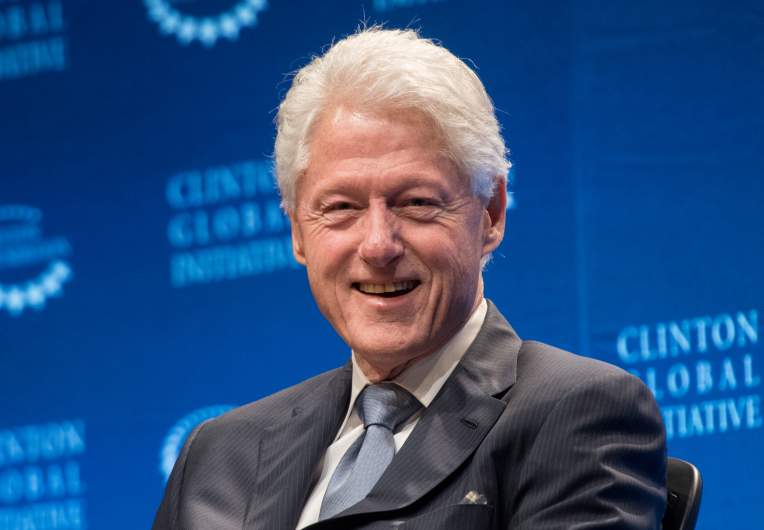
GettyBill Clinton
In 2009, GQ Magazine published an interview with Branch, the historian.
“Meeting late at night and sometimes through the night, Clinton and Branch embarked on a series of seventy-nine conversations about politics, the presidents, the Whitewater investigation, and yes, even Monica—recording every word for posterity,” the article says.
“Acutely aware that their tapes could be subpoenaed at any moment and desperate to avoid making them public, Clinton squirreled away the cassettes in his sock drawer and has never spoken of them nor made them public,” it says.
According to Reuters, the theory that the Clinton case exonerates Trump “is vigorously disputed by national security experts, including former National Archives litigation director Jason Baron, who is now a professor at the University of Maryland, and Bradley Moss of the Mark S. Zaid law firm.”
Both told Reuters there were “clear distinctions between the audiotapes in the Clinton case and records in the Trump indictment.
The Clinton tapes, Baron told Reuters, “were in the nature of a diary or journal in recorded form,” which meets “the definition of a personal record in the Presidential Records Act,” per Reuters. “But the documents with classified markings that were seized from Mar-a-Lago, ‘were official government records that should never have been transferred out of the government’s hands,'” Baron told Reuters.
In addition, Moss told Reuters that the Espionage Act charges against Trump don’t revolve around the question of personal vs. presidential records.
“Whether as a presidential record or a personal record, the records at issue in this indictment still have classification markings and contain information relating to the national defense,” he told Reuters.
The indictment says Trump, as president, “had lawful access to the most sensitive classified documents and national defense information gathered and owned by the United States government.”
According to the indictment, Trump “gathered newspapers, press clippings, letters, notes, cards, photographs, official documents, and other materials in cardboard boxes that he kept in the White House. Among the materials Trump stored in his boxes were hundreds of classified documents.”
“The classified documents Trump stored in his boxes included information regarding defense and weapons capabilities of both the United States and foreign countries; United States nuclear programs; potential vulnerabilities of the United States and its allies to military attack; and plans for possible retaliation in response to a foreign attack,” the indictment against Trump reads/
The unauthorized disclosure of these classified documents “could put at risk the national security of the United States, foreign relations, the safety of the United States military, and human sources, and the continued viability of sensitive intelligence collection methods,” the indictment says.
When Trump left the White House he “caused scores of boxes, many of which contained classified documents, to be transported to The Mar-a-lago Club in Palm Beach, Florida, where he maintained his residence. Trump was not authorized to possess or retain those classified documents,” the indictment reads.
The indictment accuses Trump of storing the boxes with classified documents in various locations at Mar-a-Lago, including “in a ballroom, a bathroom and shower, an office space, his bedroom, and a storage room.”
4. There Is Vigorous Debate Even Among Conservatives About the Strength of the Clinton Sock Drawer Defense
Tom Fitton, the president of Judicial Watch, tweeted, “I’ve carefully reviewed the indictment of Trump by his political opponents at the Biden Justice Department. (.@JudicialWatch has nearly 30 years of experience litigating federal and presidential records issues, including the famous “Clinton sock drawer” case.)”
Fitton alleged: “The document dishonestly ignores the U.S. Constitution, the Presidential Records Act, legal precedent, and the DOJ’s/Archives’ previous position that WH records a president takes with him when he leaves the White House are presumptively personal and not subject to review by partisan Biden appointees at DOJ or Archives.”
Continued Fitton, “Under the Constitution, federal law and precedent, none of the documents are currently ‘classified’ or ‘national defense information’ that restricts Trump’s handing of them. They are ALL his personal records and, frankly, should be returned to him. If justice prevails, this indictment won’t survive scrutiny by honest, constitutionalist judges and will be thrown out.”
Rick Esenberg, president of the conservative Wisconsin Institute for Law & Liberty, wrote his own legal analysis on Twitter. “Lots of Republicans are arguing that the Presidential Records Act and the decision in Judicial Watch v. NRA make clear that Trump is being persecuted. I can imagine a band of arguments that Trump’s lawyers might make based on these authorities but they aren’t good ones,” Esenberg tweeted.
“To buy them, you have to conclude that the PRA overrides the Espionage Act (the presumption is a reading that preserves both) and overrides classification law such that a President can designate what are clearly ‘presidential records’ under the law as ‘personal’ records,” Esenberg continued. “Given the statutory definition of ‘presidential’ and ‘personal’ under the law, classified docs can’t be ‘personal.’ So you’d have to argue that the President can legally make ridiculous designations. And implied designation as ‘personal’ also declassifies.”
Esenberg continued:
That’s shaky stuff. But even if he can make designations equivalent to declaring that black is white and up is down, when did he do it? Apparently he never expressly did so. He must say that taking documents that were in boxes is an implied designation and declassification.
But if you say that, then the Presidential Records Act (which was intended to make clear that official documents belong to the United States and would be retained by it) is completely illusory. Maybe. Not every wrong has a judicial remedy. But given the history of the PRA, that seems like an odd conclusion. Nor is it compelled by separation of powers because it wouldn’t interfere with the President’s carrying out of his duties. But there’s even more.
If the recital of Trump’s statements is accurate, then he did not think he declassified anything. Maybe DOJ shouldn’t have brought an even meritorious case. Maybe Hillary should have been charged (or Biden should be). But that won’t help him here. This is a serious case.
5. Donald Trump Has Raised the Clinton Sock Drawer Decision in Court Filings
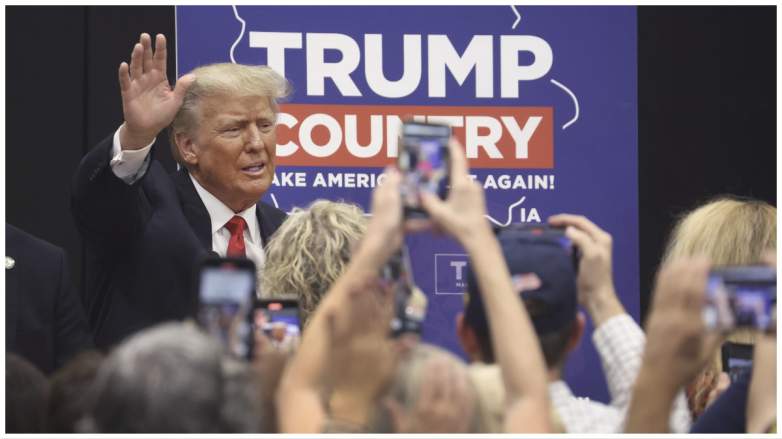
GettyDonald Trump was indicted, he confirmed.
In one court filing relating to the investigation that resulted in the documents indictment, Trump raised the Clinton sock drawer decision.
“As Plaintiff has explained in prior briefing, all government records are subject to either the Federal Records Act (‘FRA’) or the Presidential Records Act (‘PRA’),” Trump’s lawyers wrote, adding: “The PRA specifies a further distinction between Presidential records and personal records, requiring that ‘all material produced or received by the President, ‘to the extent practicable,’ be categorized as Presidential records or personal records upon their creation or receipt and be filed separately.’ Judicial Watch, Inc. v. Nat’l Archives & Recs. Admin. . . .”
The court filing says the core question is “whether a President has the authority to decide whether a document is a ‘Presidential record’ or a ‘personal record.’ Both the plain language of the PRA and past court decisions answer this question in the affirmative.”
The filing adds:
Therefore, according to the Judicial Watch court, in allocating this responsibility to the President, the PRA neither obligates nor permits the Archivist to make initial designation decisions or to take control of records that the President has designated as personal records. The PRA, then, is clear: a President determines whether a document constitutes a Presidential record or a personal record.”
READ NEXT: The Trump Prosecutor Jack Smith’s Wife Katy Chevigny.